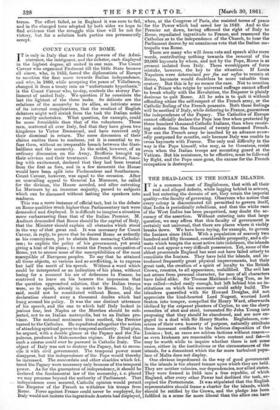THE DEAD-LOCK IN THE IONIAN ISLANDS.
IT is a common boast of Englishmen, that with all their real and alleged defects, while lagging behind in science, and but entering the domain of art, they retain the imperial quality—the faculty of governing. Observers who notice that every colony is discontented till permitted to govern itself, that India is periodically rebellious, and that the white race of the West Indies has been pauperized, may doubt the ac- curacy of the assertion. Without entering into that large question, we may affirm that this faculty of government is. certainly not universal, that there are places where it visibly breaks down. We have been trying, for example, to govern the Ionians since 1815. With a population of scarcely two hundred and fifty thousand, considerable prosperity, and a cli- mate which tempts the most active into indolence, the islands- would not appear a very difficult possession. Yet, some of the ablest proconsuls England has sent out have failed utterly to conciliate the Ionians. They have held the islands, and in- troduced frequently great physical improvements, but their great task, the creation of a spirit of loyalty to the British Crown, remains, to all appearance, unfulfilled. The evil has not arisen from personal character, for men of all characters have failed alike. Sir Thomas Maitland—King Tom, as he was called—ruled easily enough, but left behind him no in- stitutions on which his successor could safely build. The islanders quarrelled with Sir Howard Douglas, did not. appreciate the kind-hearted Lord Nugent, worried Lord Seaton into temper, compelled Sir Henry Ward, afterwards idolized by the exigeant planters of Ceylon, to use the sharp remedies of shot and steel, tormented Sir John Young into. proposing that they should be abandoned, and are now en- gaged in a duel with Sir Henry Storks. Englishmen, con- scious of their own honesty of purpose, naturally attribute these incessant conflicts to the factious disposition of the Ionians; but, as races are seldom factious without reason— as even Irishmen are reasonable when content and fat—it may be worth while to inquire whether there is not some cause, either in the institutions or the circumstances of the islands, for a discontent which the far more turbulent popu- lace of Malta does not display. One obvious impediment in the way of good government in the islands is the absurd tenure upon which they are held.. They are neither colonies, nor dependencies, nor allied states. They were formed in 1815 into a free republic, of which England, after every other Power had declined the task, ac- cepted the Protectorate. It was stipulated that the English representative should frame a charter for the islands, which should be ratified by the Crown, and the pledge has been fulfilled in a sense far more liberal than the allies can have intended. In 1817 Sir Thomas Maitland drew up a charter, which conceded the forms of constitutional right, but centred all substantive power in the hands of the Lord High Com- missioners. The Senate, for example, formed a Council of Five, all nominees, and the suffrage for the Lower House was limited to the nobles. The patronage was retained in the hands of the British representative, and the new system worked for some years easily enough, and in spite of the idleness of the people the condition of the islands was greatly improved. Some democratic changes were introduced in 1848-9—changes which partially surrendered the hold Sir T. Maitland had retained over the legislative machine, and greatly increased the area of the franchise. From that time to this the Legislative Assembly has proved itself the most unmanageable of Parliaments. The Members seem to re- gard themselves as forming a Convention, and neglect all work for a discussion on first principles, which, however sound, are inapplicable to the condition of the islands. A mixed race, compounded of Greeks, Italians, Sclaves, and Syrian Levantines, it is their hobby to regard themselves as Greeks of the ancient stock; and although they see the utter imbecility of the Government of the Greek kingdom, they clamour to be annexed. They are lightly taxed, their pro- perty is protected, life is secure, justice is fairly administered, they enjoy local government, they mieuse a free press, they have trial by jury, but cannot work it; and although they would lose all these blessings if they were abandoned to- morrow, and permitted to become the prey of the Greek Court, yet they are chronically discontented. Every liberal concession is employed as a basis for agitation, and every advance in prosperity as a further reason for disloyalty. It is scarcely to be wondered at that under these circum- stances the surrender of the Protectorate should often have been recommended. Sir John Young, in the stolen despatch, distinctly advised that course for all the islands except Corfu. Lord Grey has once or twice expressed an opinion favourable to concession, and the Derby Ministry were believed, a session or two since, to be considering its details. This policy, however, besides being distasteful to the national instinct for holding on, has only one broad recommendation. The island dominion is the only point in Europe at which England is in conflict with the nationalities. We do, it is true, rule Frenchmen in the Mauritius and Canada, Dutch- men at the Cape, and Asiatics everywhere. But the only European nationality offended by our sway is the Greek. Heligoland has no population worth mention. The Maltese are not, and do not claim to be, a race. The Spaniards of Gibraltar have been supplanted by one of the worst breeds of mongrels existing in the world. In the islands alone do we encounter a race who claim, with whatever foundation, to belong to one of the higher breeds of European men, with an old history, and a passionate desire to commence a new one. In that single view the surrender of the islands would be morally advantageous. But there really exists no possibility of such a solution. England can give them up neither to France nor Russia, and to give them to Greece is to give them to a Russian dependent. Austria would be as un- popular as England. Italy is the only rower to which we could safely resign the protectorate, and which might by possibility he acceptable. The 'signori have strong Italian sympathies, and some fifty of the best families of the islands still inscribe their names in the Venetian Ebro d'oro. But Italy would scarcely accept an appanage which can only be secure while the Mediterranean is free, and simply to leave the islands is to give them up to the first comer. Great Britain is bound to her :task, however distasteful, and it remains only to wait till the progress of events either offers some new solution, or produces a change of opinion in the islanders themselves. It is said that they witness with dis- taste the antics of their representatives, in which case universal suffrage might be as good a weapon in our hands as in our neighbours', but the statement, we suspect, applies only to the population of the capital. The gradual develop- ment of a wealthy class, and the steady growth of trade are far more reliable instruments thau any populace of the south. Let the Ionians once grow rich—and their wealth is increas- ing—and we shall hear little of their hostility to a Govern- ment which opens to theni a boundless trade, and protects in Manchester the men who in Zante are intriguing for her overthrow. The Government can be carried on in its essen- tial details without the Legislature, and the, protecting Power must simply ascertain every year whether the new Assembly is willing to obey the laws which permit it to exist.































 Previous page
Previous page